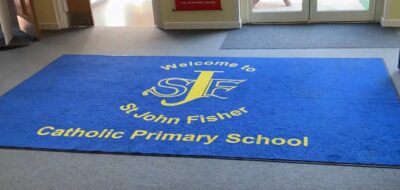Who is IQM?
IQM is the only national inclusion award in the UK. For over 20 years and in over 20 countries, schools, MATs and Local Authorities use the Inclusion Quality Mark to recognise exemplary inclusive practice.
Get in touch for your FREE school information pack today.
St John Fisher Achieves Inclusive School Award
May 11, 2023
St John Fisher Catholic Primary School has achieved the Inclusive School Award.

Core Belief of Love, Care and Being Happy
St John Fisher Catholic Primary School (Essex) has become the most recent addition to the Our Lady of Fatima Catholic Multi Academy Trust (CMAT-Harlow). The Executive Headteacher, already leading 2 successful schools in this CMAT, was invited by the Bishop of the Diocese to lead St John Fisher in September 2021. The newly appointed Executive Headteacher and Deputy Headteacher grasped the challenges of restoring this Trust to one that inspires and enjoys the previous high level of trust and confidence of its stakeholders. In doing so, they have brought in a “culture of change”. The stabilising force of the school’s Inclusion Lead as well as many of the teaching and support staff have determined the pace of improvements.

In September 2018, Ofsted rated the school as a ‘Good’ school. The autumn term 2021 brought in a more lasting change at Senior Leadership level and at the level of Governance. With clearer structures, roles and responsibilities, high expectations together with strong vision, values and aims underpinned by the Catholic ethos, the new Senior Leadership Team (SLT), took a bold and confident step to externally validate the impact of the practices thus far. In its opening statement, the school Self Evaluation Report clearly and honestly explains the decision to utilise the Inclusion Quality Mark framework and the subsequent 1-day assessment process to achieve the outcome. At the meeting with the SLT, the Executive Headteacher put in context the challenges faced but also the successes of the past year’s practices being enshrined in the school’s core belief of love, care and being happy.
Pupils Admission Numbers are Gradually Rising
Pupil admission numbers are gradually rising at the school (287 in December 2022) and rose to the current 292 number on roll (NOR). Of this number, 50 pupils (17.12%) have Special Educational Needs and Disability (SEND). A total of 48 pupils (17%) are on the Pupil Premium (PP) register with 4 pupils with Education Health and Care Plans (EHCP) and a further 7 pupils currently assessed and likely to be added to the list. For pupils with English as an Additional Language (EAL), the figures are 20.2% for the school. At this 2-form entry school, the absence rate is 5.9% with attendance at 94.1%. Persistent absence is 15.3%.

Driving school improvements takes place in this challenging context coupled with the impact of the Covid-19 pandemic on pupils’ learning, social and emotional wellbeing as well as working with the greatly increased expectations of a new SLT. Pupil and staff welfare have taken on a new dimension. Increased provisions in pastoral support for all these groups as well as supporting families in extreme need became key priorities for the school leaders. Being available and approachable to staff, parents and pupils before, throughout and after the school day was a deliberate strategy to re-build the trust which had been eroded.
Creating a whole-school approach based on a consistent approach to all things, taking ownership and being on board with the culture of change has been key to creating the cultural shift. Staff are now seen to work as “teams”. There is “coherence” and “cohesiveness”, as the school “recovers”, shares the Chair of Governors; a view endorsed by the Vice Chair. The provision for inclusion by all the staff, carefully planned and co-ordinated by the Inclusion Lead, remains a real strength of the school, a point also echoed by the Executive Headteacher in an earlier discussion.
The stability provided by the middle leadership, class teachers and Teaching Assistants (TA) during the lengthy and difficult period proved essential in maintaining “an excellent record of raising achievement for all pupils”. At Governing Body meetings, leaders are pushed and challenged on pupil progress and attainment, particularly in respect of those pupils who are on the Pupil Premium and SEND registers. Discussions around closing the gap remains an important part of their agenda. Formal, termly assessments provide attainment and progress data which is then used for Pupil Progress meetings with every class teacher, to plan for next steps. In addition, the regular reviews by the Local Authority (LA) and the Diocese have enabled the school to be single minded in its journey of school improvement.
No Place for Racism

In the school’s ethos statement, the central themes of ‘Love, Respect, Caring and Safe’ are paramount in the learning environment. “No place for racism in our church and education community” together with “promoting inclusion and a culture of respect”, seem to be key principles behind the main school priorities. Linking these to the British values of tolerance and the Catholic belief that “everyone is made in the image and likeness of God”, has enabled the whole school and the wider community to accept these challenges of modern times whilst simultaneously furthering the inclusive ethos for all in the education community. Indeed, the ‘Caritas’ curriculum (love of humankind) represents the central belief used to systematically review the curriculum to achieve this objective.
The benefits of belonging to the CMAT are extensively described in the Self Evaluation Report. Joint staff training and development, moderation, joint learning reviews and the sharing of good practice across the Trust have helped to support adaptive teaching practices at St John Fisher. Our Assessor was able to see during the visit, a calm, purposeful, safe and secure learning environment for pupils and staff alike.
Each Child Has a Voice
When some staff were asked to describe the inclusion ethos at the school in a few words, without hesitation they shared, “each child has a voice, no one gets left behind, inclusion of all pupils”. Words, such as “welcoming, scaffolding, caring, teamwork”, were proudly used to paint a very positive picture. Every adult who contributed to the IQM assessment day demonstrated a genuine commitment to the inclusion agenda.

The modelling of positive behaviours and relationships observed on the day, highlighted the deep impact of the school’s ethos, values and the mission, all prominently displayed and ubiquitous. Happy and smiling faces extending a warm welcome to the Assessor on the penultimate day of the Easter holidays, with the school still recovering from hosting a Catholic School Inspection only a few days prior and a whole school Easter assembly planned for parents in the afternoon, showed professionalism and commitment to the inclusive ethos.
Pupils understand the standards expected of them and were fully able to articulate the consequences. That the staff go over and beyond, using their knowledge of each family in the school to target appropriate support, in and outside school, has further cemented the trust with the parents. A listening school, where parents, pupils and the community voices are actively heard and acted upon, is further enriching the pupils’ learning experiences.
Staff Showed Enthusiasm and Passion
For the Inclusion Quality Mark Assessment, the senior leaders provided all the requested documents to support the process.
Staff showed enthusiasm and passion for inclusion whilst sharing their journeys and achievements. The reflective culture modelled by the senior leaders revealed the commitment and dedication the staff place on the school improvement process.
Leaders are aware of the school’s strengths and have plans to address the areas identified for improvement. Our Assessor is confident the school will continue to implement the priorities outlined in the School Improvement Plan (SIP) for this year and to be optimistic about the impact they will have on inclusive practices.
Find out more about the IQM Inclusive School Award
If your school is interested in obtaining the IQM Inclusive School Award or you wish to talk to a member of the IQM team please telephone:
028 7127 7857 (9.00 am to 5.00 pm)
or email: info@iqmaward.com for further details.
Want more information on the IQM Award? Click here to request your free IQM information pack.
Other Posts

About IQM
The only national award for inclusion in the UK, IQM has been committed to recognising exemplary inclusive schools for over 20 years and in over 20 countries around the world. The three awards allow schools and organisations to celebrate their inclusive practice against nationally recognised framework.
Site Links
© 2026 Inclusion Quality Mark | website developed & cared for by digidoda


